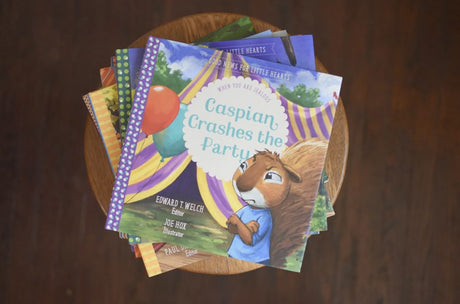
Helping Your Child with Jealousy
Does your child struggle with jealousy from time to time? Here are biblical truths to keep in mind about jealousy and how to handle it.
May 16, 2024
I was a cocky six-year-old. I didn’t know it. I didn’t mean to be. But I was. One particular day I had beaten my friend at wiffleball. We went to my house for a snack, and I made a pompous announcement that went something like, “Well, my team sure is feeling pretty good about winning that game!”
My mom asked, “How do you think saying that makes Christopher feel?”
Her question stopped me in my tracks. I hadn’t thought about how he might feel. I instantly knew, however, that I would not like it one bit if he’d done that to me.
In the moment I felt guilty and embarrassed, but that brief interaction was the beginning of the Lord teaching me to consider the feelings of others. It was the beginning of my realization that I needed to go to God for forgiveness for only thinking of myself and ask for his help to change.
There is no one Bible verse that commands us to walk in other people’s shoes or show empathy. There are, however, countless passages that cannot be understood or obeyed without understanding another person’s experience from their point of view. Here is a small sampling:
This leads to a simple point: the Biblical view of being with someone is deeper and far richer than merely occupying physical space with them. And being with us is the greatest blessing God bestows.
The problem we face with empathy is that we are born sinful. Self-centeredness is baked in. Part of growing more like Jesus is learning how we can bring different, personally tailored good to others (see Ephesians 4:29).
Walking in someone else’s shoes does not mean agreeing with every step they take! Sadly, the world often demands that we affirm whatever someone feels as valid and true. But, as every parent of a young child knows, understanding that your toddler feels that a cookie is the only right choice for breakfast does not make it so.
As parents we need to think about how to help enlarge and reorient our child’s perspective Paul prays for the Philippians: that their love would “abound more and more in knowledge and depth of insight” (Philippians 1:9). This is precisely what we should want for our children. The more they love others, the more they will want to know them and know about them. In fact, you already see it: your children’s love for dolls, dinosaurs, or dessert drives them toward an ever-deepening knowledge of dresses, dilophosauruses, and donut flavors. Love drives learning. The more our children (and we ourselves) understand someone else’s world from the inside, the more they will be equipped to love that person in ways that are fitting and fruitful. Love thirsts for knowledge about those it loves. And knowledge in turn empowers love to act with precision and fruitfulness. And, of course, it all starts with going to God for forgiveness and asking for his help to change.
Make yourself stop and mentally slip on your child’s shoes regularly. In doing so, you will inevitably model other-centered compassion, building an experiential scaffolding for them to stand on. “This is what it feels like to be cared about.” Your example becomes their template.
Share how you experience things, what you are thinking, what you are desiring, where you are nervous, and when you need to go to God for forgiveness. In doing this, you are stirring the raw data of another human being’s perspective into the dough of their childhood. The reality that other people see, feel, and think differently gets baked in. Now be careful not to become manipulative! Saying things like “You need to think how Mommy feels—all your whining is so annoying!” or “Can’t you see that Daddy just wants some peace and quiet for once?!” is self-serving and destructive. Far from expanding empathy, such comments teach children that forcing your perspective on others is an effective way to control their behavior and ignore their wants and needs.
This simple question is effective and important because it pushes back against our inherent self-centeredness. Your children (and, in fact, we all) need a steady diet of opportunities to put themselves in the place of another.
As with any steady diet, change will be nearly imperceptible. But over the years it will illuminate your child’s internal struggle between love for self and love for others. That allows you to set the table for a conversation between your child and the Lord about growing in love for others and deepening endlessly in their appreciation of how he has loved them. Let’s pray it is a shared meal over which your child lingers with the Lord forever.
The above content was adapted from Tomas Looks Up and Out © 2023 by J. Alasdair Groves. May not be reproduced without prior written permission.
This article is republished with permission from New Growth Press.
More about Tomas Looks Up and Out:

Some or all of this line is backordered and will ship as soon as it is back in stock.